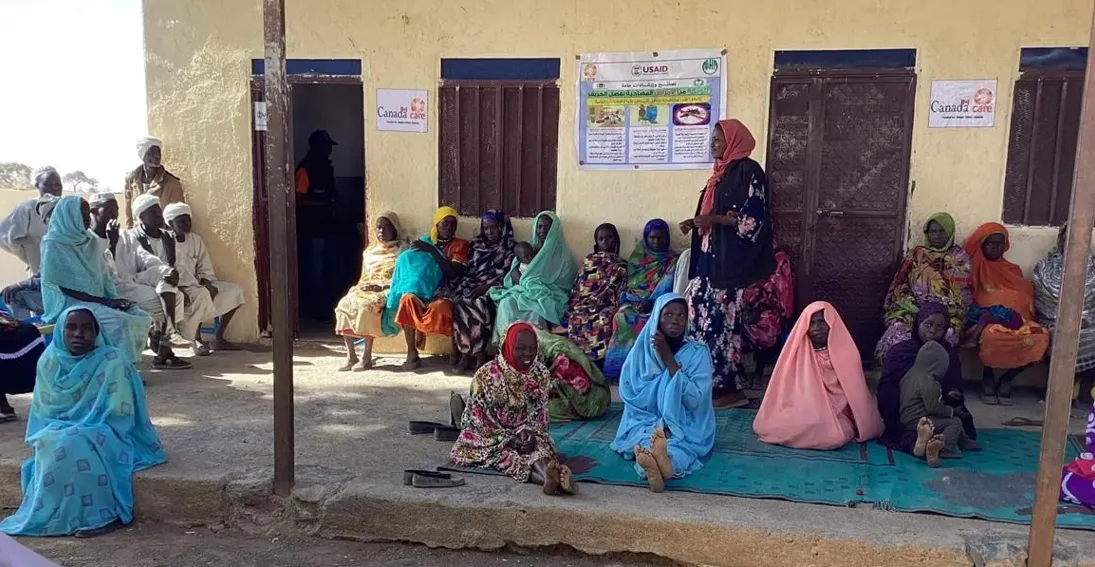Nairobi, Kenya, June 11, 2024 – Sudan’s East Darfur region is facing a catastrophic humanitarian crisis as the conflict in El Fasher, the capital of North Darfur intensifies. The fighting there has led to the death of at least 200 people, and over 1,000 injuries. Over 800,000 people have fled the city to date, many of whom have been displaced multiple times already, into neighboring East Darfur increasing pressure on already strained minimal resources in the state.
“The daily arrival of exhausted individuals, many suffering from severe health issues and deep emotional wounds from the trauma they experienced, is truly heart-wrenching,” said Dr Hawa* who works in a medical center supported by CARE in East Darfur. “It is deeply concerning to witness so many malnourished children and unaccompanied minors arriving every day. We are also seeing an increase in the number of women and girls who have endured violence coming to our health center. Unfortunately, we lack sufficient healthcare supplies to treat the many cases we receive.”
The long, harrowing journey from El Fasher to East Darfur is over 300 kilometers, and those fleeing face temperatures topping 50° Celsius (122°F), even as the region is poised to face “the hottest year in decades.” Most escaped at a moment’s notice due to the fighting with only the clothes on their backs, without any food or clean drinking water. Moreover, all are subject to multiple checkpoints along the route where the threat of extortion and theft is high.
The humanitarian impact of the conflict across Darfur, exacerbated by the recent fighting in El Fasher, is significant and multifaceted. Essential supplies such as food, water, and fuel are scarce. What is available for sale is exorbitantly priced. As famine looms across Sudan, the violence in El Fasher has significantly disrupted the delivery of critical aid into East Darfur as El Fasher serves as the main route for supplies into East Darfur.
The destruction of health centers and disruption of supplies to the few remaining facilities has overwhelmed the health care system. Thousands of civilians, already displaced and facing violence, are left without critical medical care, worsening their suffering. Among their many challenges, health workers are struggling to provide essential nutrition supplements to the growing number of severely malnourished children that have been classified as Extremely Critical.
“The recent surge of internally displaced people from El Fasher to East Darfur has worsened the existing crisis,” said Abdirahman Ali, CARE Sudan Country Director. “Not only are the displaced families desperately in need of food, water, and healthcare, but the already strained host communities are struggling to cope. We cannot continue to turn a blind eye to the ongoing violence and deteriorating humanitarian crisis in Sudan.”
CARE calls for an immediate end to the conflict in El Fasher and across Sudan to stop the suffering that millions across the country are experiencing. All parties must stop attacks on civilians, halt violence against women and girls, refrain from looting or destroying essential assets, and allow the free movement of civilians and humanitarian aid. Ensuring the safety of humanitarian personnel and infrastructure is critical, along with facilitating unimpeded access to essential supplies and services, including medicines, food, and agricultural inputs. Adequate funding for the humanitarian response, particularly for protection and violence prevention and response programs, is crucial. Sadly, over 84% of funding needs remain unmet. A strategic, comprehensie approach to food and livelihood interventions is necessary to mitigate and address the dire humanitarian situation.
*Name changed to protect identity.
For media inquiries, please contact: usa.media@care.org
David Mutua, CARE East Central, & Southern Africa Regional Communications Advisor: david.mutua@care.org
Note to Editors
- CARE has been operating in Sudan since 1979, implementing humanitarian and development programs focused on women’s and girls’ empowerment, justice, humanitarian action, and resiliency.
- CARE supports over 83 health facilities in six states in Sudan, providing life-saving health and nutrition services.
- The resumption of nutrition and Health Services in Nyala was made possible thanks to generous funding from USAID – Bureau for Humanitarian Assistance and European Union Humanitarian Aid.
- CARE’s lifesaving operations are ongoing in:
- East Darfur – water provision to refugees and host community and Health services
- Gedaref – WASH provision for refugees, IDPs, and host community and Health services
- Al Gezira – WASH provision to IDPs and host community
- South Kordofan- Supporting Women’s Empowerment through economic and livelihoods activities
- South Darfur- Provision of WASH, Livelihoods and Community empowerment
- Khartoum: Provision of MPCA to most affected populations in Jebel Awily, Mayo and Kalari communities

